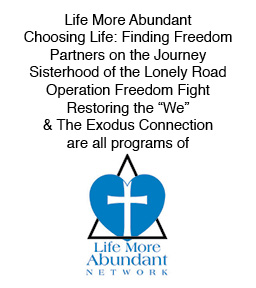The Process of Grieving
In the last post we talked about the importance of grieving a loss thoroughly. Today we’ll talk more about the “How’s” of that process.
- SHOCK/DENIAL (numbness, blanking out, avoiding thinking about “it”) Denial is a normal first response that protects us from an onslaught of intense feelings that we’re not ready to deal with mentally, emotionally or spiritually. The more important the person or thing was to us, the stronger our denial is likely to be. Even though that initial denial is completely normal, if we stop there and refuse to let ourselves move on through the stages of grief to acknowledging and accepting the truth of the loss, we become stuck. When that happens, denial stops being a temporary gift from God to help keep us from getting overwhelmed, and becomes a destructive force that causes additional losses throughout our lives. When we are in denial we may hear ourselves saying things like “It can’t be true”; “It’s no big deal”; and “It doesn’t bother me.”
- ANGER (blaming someone or something or feeling injustice and rage) Once we admit our loss and our powerlessness to change the truth, we may look for a person or thing that caused the loss. We may blame God, our society, or our family for our predicament. The way in which we experience or express our anger can work for or against us in this process. Healthy anger is energizing, and can give us the impetus to move into positive action. In its destructive form, however, anger can build bitter resentments, create rebellion or manifest itself in verbal or emotional abuse toward others. Anger turned inward may lead to serious depression or physical illness. To get past this state we must acknowledge our anger and express it. When we are in the anger stage we may be saying things along the line of “How could this happen to me?“; “It’s not fair”; and “What right do they have to do that to me.”
- BARGAINING/GUILT (facing the built, vain regrets of the past and fear of the future) In the bargaining state we are attempting to gain some control over our situation. We try to come up with a way to get back what we lost and avoid the painful guilt and regret that we have about any part we’ve convinced ourselves that we played in the loss. This stage is often full of “why” questions that have no answer. We may attempt to bargain with God (If I stop doing this, will you restore what I lost?” or “If I do this, will you make the pain go away?”) In the case of a lost relationship, we might try to bargain with the other person in an effort to get them to return. (“If you come back, I’ll do thus and so”) or we may try, too quickly, to replace the lost person with someone else. We adopt a kind of magical thinking where we believe that our actions can change the outcome. At some point, however, we must face our limitations and realize that no matter what we say or do, the bitter truth is that things will not go back to the way they were before. It’s only we admit that that we will be able to move into the next phase. In this stage our self-talk may include things like “If only I had just . . .”: I wish I could have . . . “; and “Maybe if I do this . . . “
- DEPRESSION/SORROWING (feeling hopeless, helpless, disappointed, isolated and lonely, unable to enjoy anything) When we are finally able to acknowledge that the loss is real, we may sink into deep sorrow. This is usually the part of grieving that we try the hardest to avoid. The intense experience of sadness leaves us with little energy for anything else. It’s common to find ourselves sobbing over the smallest thing or crying for days on end. We may feel loneliness, self-pity and isolation. We may also feel our life is over—that we can’t continue. This sorrow, and the amount of it, actually honors the importance of what you lost. It is an honest admission of how much it meant to you. This is, undoubtedly, the most painful part, but the good news is that once you reach this stage, you’re almost done! At this point, we’re likely saying things like “I don’t care anymore”: “I’m sad”; and “I can’t stop crying.”
- ACCEPTANCE (embracing reality, forgiving and moving forward, forming new friendships) This is not saying, “It’s OK that this happened to me.” It is the realization that it DID happen. Once our authentic thoughts and feelings are expressed and acknowledged, we are in a position to receive comfort. We may always miss being able to share our life with someone who is gone. We may still regret that certain things happened (or didn’t happen) in our lives. We don’t have to forget how much our loss meant to us in order to move on. Time alone will not heal our wounds. It is only when we can come to terms with the reality of the situation, recognize it as a fact of our lives, and gradually let go of the struggle against the tide of emotions that we experience, that we can move beyond our suffering. We can find peace within ourselves, even in our new circumstances. We can finally say “this really did happen to me,” “I’m feeling better.” I’m feeling hope.”
The grieving process is not usually as linear as this list might seem to show. You may find that, for a time, you will jump back and forth between the various stages. This is normal as you get in touch with different facets of the loss. Just keep with it and try not to lose hope. You WILL get there, if you don’t give up!
Tips to expediting the process:
2. Acknowledge what you lost and the magnitude of that loss.
- Many people find journaling or talking with other people or God about their loss to be very helpful in helping them move through the stages of grief.
- Others have discovered that creating a special collage, a scrapbook, or other artistic momento relating to their loss, helps them solidify and face their buried thoughts and feelings.
- Still others find it helpful to write a letter to the person or thing that has been lost. In this letter they describe what they lost, things they remember or miss, feelings they have when they think about it (anger, fear, guilt, etc.); and what this person or thing brought to or taught them about life.
- You may find that a symbolic ceremony like burning the letter you wrote, or throwing an object representing your pain into the water can help in the letting go process.
3. Determine what the authentic need was that this person or thing met for you. Often it is something like acceptance, mentorship, a sense of purpose, a connection to your past, or support or security. Once you become aware of what it was, you can start to prayerfully search for other healthy ways to meet that need in your life.
As you begin to fully accept your losses and the feelings that go with them, the intensity of the bad feelings will diminish. You may still experience twinges of sadness from time to time, but the agonizing pain will be gone and you will start being able to experience good feelings when you reminisce.


Leave A Response